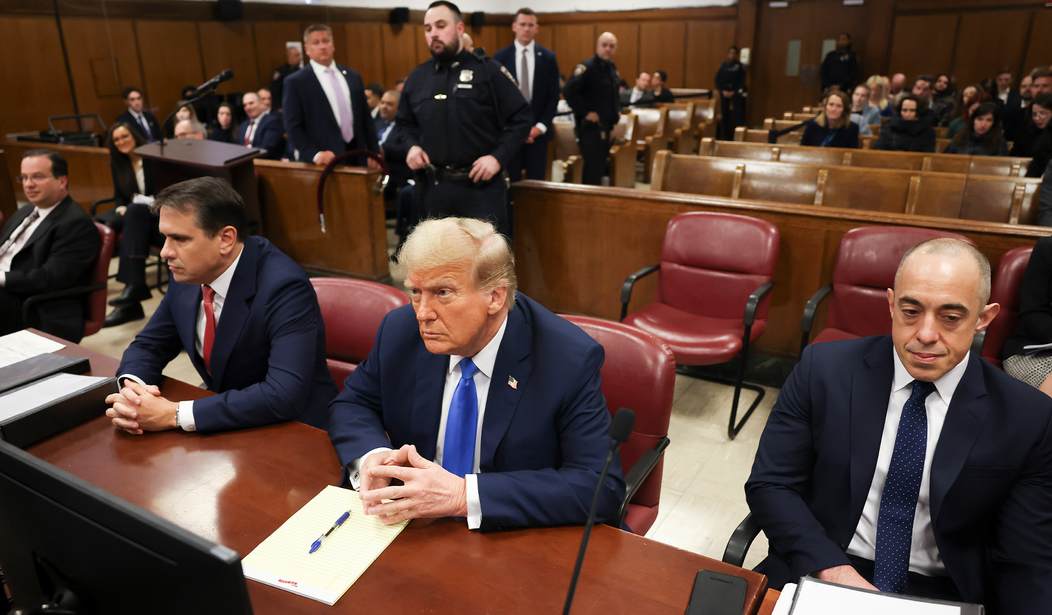Now that the jury in Donald Trump's "hush money" trial in Manhattan has retired to deliberate, there is a waiting period of an unknown length ahead of us. But the trial kept delivering startling moments and headlines right up until the closing bell, most of them once again revolving around the antics of Judge Juan Merchan, the Democrat Biden donor who has been making the defense leap through hoops at every opportunity. That pattern repeated itself even during the closing arguments, which typically run fairly smoothly, particularly when you have attorneys as seasoned as Trump's. Yet as soon as Todd Blanche concluded his closing arguments and the jurors were sent out for lunch, the judge ripped into Blanche along with the prosecutors. So what was his offense? Criticizing the prosecution's "star witness," Blanche told the jury, "You cannot send someone to prison based on the words of Michael Cohen." This was apparently a bridge too far for reasons that were never fully explained. (NY Post)
Manhattan Supreme Court Justice Juan Merchan ripped Donald Trump attorney Todd Blanche for suggesting to jurors that the former president could be sent to prison if convicted.
Blanche, in his closing argument, had told the jury: “You cannot send someone to prison based on the words of Michael Cohen.”
Prosecutors objected and the judge sustained it, striking the comment from the record, but jurors still heard it.
After jurors were sent out for lunch, prosecutors claimed the statement “was a blatant and wholly inappropriate effort to call sympathy for their client.”
We can look at this from a technical perspective or as a matter of simple common sense. The jurors are only charged with determining the innocence or guilt of the defendant, not the sentence he might receive if he is found guilty. That is left up to the judge after negotiations with the prosecution and the defense. So from that perspective, perhaps Blanche would have been better off saying, "You cannot convict someone..." But at the same time, those jurors have been sitting there for weeks hearing testimony about someone who is in criminal court facing 34 charges. Do any of them think it's unimaginable that someone being found guilty of that many charges might wind up behind bars? Are we to pretend that they aren't already taking that into consideration as they deliberate? It's nonsensical to believe so.
Then there were the judge's jury instructions. In case you missed them, you can read a summary of them from CNN here and a supposedly full transcript in .pdf format here. (Warning: It's 55 pages long and I read the whole thing today.) I used the word "supposedly" for a reason. While CNN was giving breathless, moment-by-moment coverage of the closing, they quoted the judge saying something that doesn't show up in either document. I wasn't recording the segment so I don't have the exact wording at hand, but he admonished the jury about believing that he (Merchan) had an "opinion" or a "preference" as to the outcome of the trial. He assured them that nothing could be further from the truth and if they had any such impression they must 'put that from their minds at this time.' (Paraphrased)
I've served on a jury and that is not any sort of standard jury instruction. The judge is supposed to run the trial in a manner that is fair to both sides equally. That clearly didn't happen here, as many legal analysts have observed, but that's supposed to be how it works in theory. None of the witnesses accused the judge of bias in front of the jury. Nor did the defense attorneys or the prosecutors. (It would be insane for the prosecutors to do it since they were benefitting from it.) So why would Merchan bring it up during the jury instructions unless he suspected that they had observed him acting in a biased fashion and/or picked that up from the news when they went home at night? Yes, they're supposed to "avoid any news," but we all know that's basically impossible in the modern era.
In any event, the jury moved to deliberations. By mid-afternoon, they had already sent a note to the judge asking to have four sections of testimony read back to them again. They have to consider and vote on nearly three dozen charges. Anyone who expects this to be over suddenly in one direction or the other is probably in for a long, disappointing wait.








Join the conversation as a VIP Member